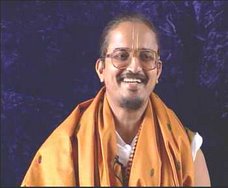Nama Article 31st December 2013
Jan 1st 2014 Hanuman Jayanthi is celebrated in our Madhurapuri ashram, Jaya Hanuman !
Await details of Live webcast for Kapatharu day Jan 1st New year Mass prayer by
Sri Swamiji @ http://www.namadwaar.org/home.php
Excerpts from a discourse by our Sri Sri Muralidhara Swamiji
Hanuman was a great tapasvi and brahmachări, 'Chollin Selvan' - none could speak like him. Two connotations are attached to this term 'Chollin Selvan'. One is - a person who could speak very well, 'Văkmi' (one who cannot be defeated in a debate) and not just 'Văk Chăthurya' (speak intelligently). None could equal him in dialogue because He was 'Nava vyăkarana Pundit' - well learned in the nine 'Vyăkaranăs'. His choice of words and delivery is unparalleled. The second one is - Hanuman has said (to Rama), 'Yatra Yatra Raghunătha keertanam tatra tatra kritamastakănjalim' -- Wherever your praise is sung there will I go! He is, therefore, known as 'Chollin Selvan' - 'Chol' spoken (wherever Rama's praises are spoken); 'Selvan'- one who will go there --- One who will go to the places where Rama's praises are uttered!
Please check these: Excerpts from a discourse by our Sri Sri Muralidhara Swamiji
The mouth did not close ! Time passed and Lord Rama's mouth remained open!
Chanting the Name of Răma, Hanuman crossed the ocean! -- and, lifted the mountain!
Mountain sized sorrows melt away like the fog!
Catch hold of this divine Name and go on doing your work in the world.
Both Hanuman and Panduranga are considered to have 'Shiva amsa' in them.
If you think of God day and night, you will acquire the nature of God.
I sit under the Kalpataru (wish fulfilling tree) of Sri Rama Whenever I desire any fruit I get it.
Chant the Mahamantra Nama kirtan :
Hare Rama Hare Rama Rama Rama Hare Hare
Hare Krishna Hare Krishna Krishna Krishna Hare Hare
